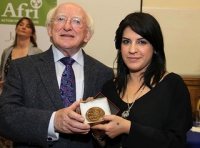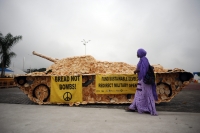by Tamara Lorincz, Senior IPB Researcher, September 2014, 80pp
To help countries chart a path to low-carbon energy systems and economies, the UN launched the Deep Decarbonization Pathways Project (DDPP). However most of the military sector’s fuel consumption and emissions are excluded from national greenhouse gas inventories. In Demilitarization for Deep Decarbonization: Reducing Militarism and Military Expenditures to Invest in the UN Green Climate Fund and to Create Low-Carbon Economies and Resilient Communities, IPB argues that war must stop for global warming to slow down. Military expenditures must be reduced and re-directed for climate finance to create low carbon economies and climate-resilient communities. Disarmament must take place alongside mitigation and adaptation.


 IPB convened its annual Council Meeting for the first time in Ireland in partnership with the
IPB convened its annual Council Meeting for the first time in Ireland in partnership with the  With the help of its many partner organizations, IPB was able to bring the disarmament perspective to Rio+20. Through our side events on ‘disarmament for development’ and ‘the linkages between food security and armed conflicts’, we were able to discuss with other stakeholders the importance of disarmament and to encourage them to join our call.
With the help of its many partner organizations, IPB was able to bring the disarmament perspective to Rio+20. Through our side events on ‘disarmament for development’ and ‘the linkages between food security and armed conflicts’, we were able to discuss with other stakeholders the importance of disarmament and to encourage them to join our call. Six panels juxtaposing the costs of weapons and those of specific development projects were presented as an itinerant exhibition at the
Six panels juxtaposing the costs of weapons and those of specific development projects were presented as an itinerant exhibition at the